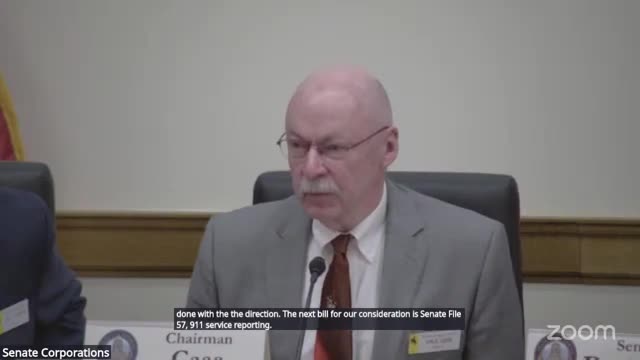Committee advances Senate File 57 to require 911 outage reporting framework, adds Public Safety Communications Commission as recipient
Get AI-powered insights, summaries, and transcripts
Subscribe
Summary
Senate File 57 would add the Public Safety Communications Commission as a recipient of 9-1-1 reporting and direct a rulemaking to set Wyoming-appropriate outage reporting thresholds; the committee approved the bill and sent it to the floor.
The Senate Corporations, Elections & Political Subdivisions Committee voted to advance Senate File 57, a measure to adjust 9-1-1 reporting and add the Public Safety Communications Commission (PSCC) as a recipient of outage and funding reports.
The bill directs a Wyoming rulemaking process to set reporting parameters for 9-1-1 outages and shifts certain 9-1-1 fee collection and expenditure reporting from fiscal-year to calendar-year reporting to align state reporting with federal requirements and grant eligibility.
"One of those requirements, the trigger point, is 900,000 user minutes have got to be down before that trigger comes into play," Nate Smolinski, Wyoming statewide 9-1-1 coordinator, told the committee, noting that federally triggered notifications can be slow to apply in sparsely populated states where the numeric trigger can take days to reach.
Why it matters: Committee members and witnesses said Wyoming's geography and the number of smaller public safety answering points (PSAPs) mean a federal outage threshold measured in aggregated user-minutes may not give local public-safety officials timely notice of outages that affect small communities. The bill allows the state to adopt reporting thresholds and a reporting process better matched to Wyoming's needs, with an emphasis on minimizing burden to carriers and consolidating reporting into a single submission.
Key points from testimony
- Local reporting thresholds: The bill calls for the Public Service Commission to conduct rulemaking to develop reporting criteria that will be more appropriate for Wyoming than federal thresholds that use large, national aggregates.
- Single-report approach: PSC witnesses described plans to arrange reporting so carriers file a single report that will be distributed to the PSC, the PSCC and, when appropriate, Homeland Security and local emergency responders to avoid duplicative filings.
- Calendar-year reporting: The bill also moves PSAP 9-1-1 fee collection and expenditure reporting to calendar-year reporting to better align state submissions with federal grant and reporting cycles.
- Technical and organizational context: Committee speakers discussed the state's long-term challenges in moving to next-generation 9-1-1 (NG9-1-1), staff and cost pressures at PSAPs and potential regionalization strategies such as shared call-handling platforms to spread costs without removing local control.
Votes
- The committee approved Senate File 57 on a roll-call vote: Senator Bonner ' Aye; Senator Dockstader ' Aye; Senator Landon ' Aye; Senator Steinmetz ' Excused/absent; Chairman Case ' Aye. Tally: 4 ayes, 1 absent. Outcome: approved by the committee for floor consideration.
What comes next
Senator Landon volunteered to carry the bill to the floor. Committee members and witnesses said the rulemaking process authorized by the bill will be used to develop Wyoming-appropriate outage reporting thresholds and that stakeholders including carriers, PSC, PSAPs and Homeland Security will be part of those conversations.
Ending
Supporters said the bill is a targeted, operational fix to give Wyoming authorities timelier and less burdensome outage reporting tools while the state continues to plan for longer-term NG9-1-1 upgrades.
